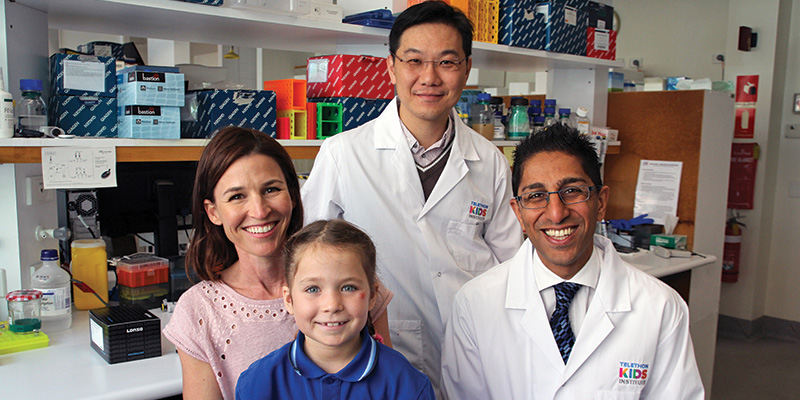Search

News & Events
Researchers unlock key to slowing leukaemia progression in kidsWhen three-year-old Flo Parker injured her hip on a camping trip five years ago, her parents thought it would be nothing more than a common childhood injury.
News & Events
Ependymoma Awareness DayEthan was not even two when he was diagnosed with a rare type of brain tumour known as an ependymoma.

News & Events
World-first research to transform outcomes for First Nations children with cancerA first of its kind research program at The Kids Research Institute Australia aims to develop new strategies to better treat First Nations children with cancer.
Research
Histological predictors of outcome for cutaneous squamous cell carcinoma in renal transplant patients: A case-control studyCutaneous squamous cell carcinoma is a significant cause of morbidity for immunosuppressed patients such as organ transplant recipients; however, histological parameters which predict the likelihood of tumor progression are typically based on general population studies in which immunosuppressed patients represent only a small fraction of cases.
Research
National brain tumour registry: a new era of research collaboration with ChinaCancer continues to be a leading cause of death globally. However, there remains a significant disparity in the reported incidence of cancer in developed countries, estimated to be 295.3 cases per 100,000 people, compared with only 115.7 in developing countries. Some of the reasons for this variation include lack of robust data collection with limited reporting systems, and insufficient data availability in the registries of these developing nations.
Research
Activation of Hedgehog signaling by the oncogenic RELA fusion reveals a primary cilia-dependent vulnerability in supratentorial ependymomaSupratentorial RELA fusion (ST-RELA) ependymomas (EPNs) are resistant tumors without an approved chemotherapeutic treatment. Unfortunately, the molecular mechanisms that lead to chemoresistance traits of ST-RELA remain elusive. The aim of this study was to assess RELA fusion-dependent signaling modules, specifically the role of the Hedgehog (Hh) pathway as a novel targetable vulnerability in ST-RELA.
Research
Type I interferon subtypes differentially activate the anti-leukaemic function of natural killer cellsNatural killer (NK) cells have an intrinsic ability to detect and eliminate leukaemic cells. Cellular therapies using cytokine-activated NK cells have emerged as promising treatments for patients with advanced leukaemia. However, not all patients respond to current NK cell therapies, and thus improvements in efficacy are required.
Research
Home-based multidisciplinary interventions on skin adverse reactions in EGFR-The Kids-treated patients with lung cancer: a protocol for a randomised controlled trialHere, we provide a feasible, well-designed protocol of a randomised controlled trial for the assessment of the effects of a home-based multidisciplinary intervention on the severity of skin adverse drug reactions and health-related indicators in patients with non-small cell lung cancer (NSCLC) under epidermal growth factor receptor tyrosine kinase inhibitor (EGFR-The Kids) therapy.
Research
The Role of Cannabinoids as Anticancer Agents in Pediatric OncologyCannabinoids are a group of chemicals that bind to receptors in the human body and, in turn, modulate the endocannabinoid system (ECS). They can be endogenously produced, synthetic, or derived from the plant Cannabis sativa L. Research over the past several decades has shown that the ECS is a cellular communication network essential to maintain multiple biological functions and the homeostasis of the body. Indeed, cannabinoids have been shown to influence a wide variety of biological effects, including memory, pain, reproduction, bone remodeling or immunity, to name a few. Unsurprisingly, given these broad physiological effects, alterations of the ECS have been found in different diseases, including cancer.
Research
Immunogenicity of the inactivated influenza vaccine in children who have undergone allogeneic haematopoietic stem cell transplantThis study provides evidence to support annual inactivated influenza vaccine administration to children following allogeneic haematopoietic stem cell transplant
